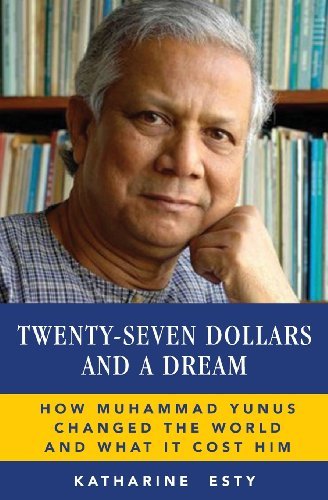
The mission of the Your Mark on the World Center is to solve the world's biggest problems before 2045 by identifying and championing the work of experts who have created credible plans and programs to end them once and for all.
Search
Additional pages
- Devin D. Thorpe
- Join the Cavalry!
- Devin's Forbes Blog
- Contact Us
- 5% for Charity
- Podcast
- GoodCrowd.info
- MySocialGoodNews.com
- Crowdfunding Conference
- Gratitude Awards
Twitter feed
Tweets by @devindthorpeFind me on...
You Don’t Have To Be Rich To Change The World
This is a guest post from Katharine Esty.

Can only billionaires like Bill Gates and Warren Buffett can change the world’s economic landscape?
Muhammad Yunus, the Bangladeshi professor-turned-banker who has been called the father of microcredit founded Grameen Bank, is proof that the answer is “no.”
A middle-class social entrepreneur living in Bangladesh, Yunus has no car, no house, no second home, no inherited wealth, and no accumulated capital. His stunning success was based on a foundation of six key elements. These elements made it possible for him to launch the microcredit movement that flung open the doors to financial services to the billions at the bottom of the economic ladder. Now over 100 million people worldwide have received microcredit. I identified the six elements while interviewing Yunus and conducting research for my new book, Twenty-Seven Dollars and a Dream: How Muhammad Yunus Changed the World and What It Cost Him.

1. A Vision
Yunus had a single, compelling vision: to end poverty – first in Bangladesh and then throughout the world. He has devoted himself to mission alone, and stuck with it over the long term.
2. A Tool
Yunus believes that the poor have a right to credit and that providing small loans to poor people to start or grow a business is an important tool for addressing poverty. He is not the only one to have thought up the idea of extending credit to the poor, but he saw the concept’s promise as a means toward ending poverty and made it his job to promote it.
3. Fundraising
Yunus is a master at raising money from international agencies and donors to fund his ideas. Without funds from outside sources at the start-up, he could not have succeeded.
4. A Successful Prototype
By starting small and slowly building the Grameen Bank from a minor pilot project to a large bank lending to over 8 millions borrowers, Yunus was able to accumulate accomplishments, proving that Grameen was sustainable and profitable and showing the world that his idea worked.
5. A Compelling Story
Yunus has taken the story of microcredit and the Grameen Bank to the world at large through speeches, newsletters, videos, conferences and articles. He has told his story over and over until the concept of microcredit became widely recognized and accepted.
6. Resilience
Yunus has bounced back time and again from defeats and betrayals. Bangladeshi bankers initially thought that microcredit was not feasible and for years they refused to support him. Yunus’ 2007 bid to launch a new political party was foiled by hostile government officials who made sure a few years later that he was ousted from his position at the Grameen Bank. At that point Yunus shifted his focus to social businesses. Now he is circling the globe promoting social business with the same dazzling energy he used to get the idea of microcredit accepted worldwide.
Yunus has won the Nobel Peace Prize (2006), the US Presidential Medal of Freedom (2009), and the US Congressional Gold Medal (2013) for his success in alleviating poverty. Only seven people in the world, including Mother Teresa and Nelson Mandela, have won this Triple Crown. Remember Yunus when things look bleak, and learn from him how to change the world yourself.
***
Katharine Esty, Ph.D., is a social psychologist and founder of Ibis Consulting Group, a leading international diversity and organizational development firm. A former consultant to the United Nations Development Program and UNICEF, Katharine has spent time in a number of developing nations, including Bangladesh, where she conducted a series of one-on-one interviews with Muhammad Yunus while writing her new book, Twenty-Seven Dollars and a Dream: How Muhammad Yunus Changed the World and What it Cost Him.
